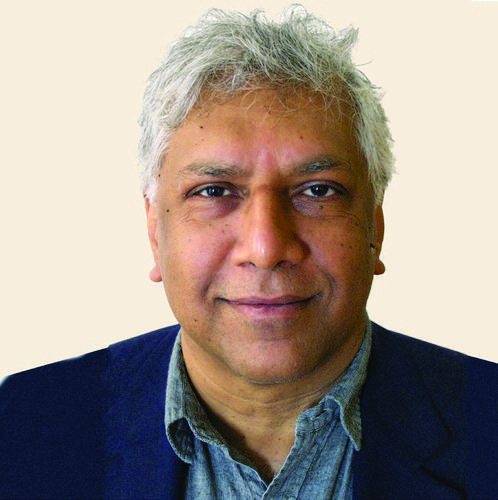Spring author series concludes with Pulitzer Prize-winning poet

Vijay Seshadri
To end the Johnson State College Spring Reading Series, Pulitzer Prize winning author Vijay Seshadri read from his books “3 Sections” and “The Long Meadow.”
The author read in Stearns Cinema on April 22.
Seshadri won the Pulitzer for poetry this year for “3 Sections,” and the James Laughlin Award in 2003 for “The Long Meadow.”
Seshadri began by reading his poem “North of Manhattan,” from “The Long Meadow.” “You can take the dire avenue bus to where the subway terminates just inside the Bronx, and be downtown just before you realize how quickly your body has escaped your mind, stretching down the tracks on a beam until the band snaps and the body slips free and is gone . . . with all the other bodies, the bundles of molecules, fusing and dispersing in sidewalks . . . ” read Seshadi.
Seshadri read “Surveillance Report,” “Bright Copper Kettles,” “This Morning,” “Memoir,” and a sequence of poems titled “Hell,” “Purgatory, the Film,” “Purgatory, the Sequel,” and “Heaven,” from “3 Sections.”
Seshadri introduced “Memoir,” saying that it was out of frustration at not being able to write his memoir. “Orwell says somewhere that no one ever writes the real story of their life./ The real story of a life is the story of its humiliations./ If I wrote that story now-radioactive to the end of time-people, I swear, your eyes would fall out, you couldn’t peel/the gloves fast enough/from your hands scorched by the firestorms of that shame,” read Seshadri. “Your poor hands. Your poor eyes/ to see me weeping in my room/ or boring the tall blonde to death./ Once I accused the innocent./ Once I bowed and prayed to the guilty . . . And one October afternoon, under a locusts tree/ whose blackened pods were falling and making/illuminating patters on the pathway,/ I was seized by joy,/ and someone saw me there,/ and that was the worst of all,/ lacerating and unforgettable,” he read.
After the reading Seshadri answered audience questions.
When asked how he felt about his Pulitzer Prize book compared to his other work Seshadri likened all of his poems and books to his children.
Seshadri reminisced about his younger book “Wild Kingdom,” which was published in 1996. “It’s one of those books you do when you’re young and you’ll never be able to do again because everything becomes more even, as you grow more skilled you know what you can do and you can’t do . . . that book has all these wild, jagged literary adventures to it,” said Seshadri.
A changed man wrote the Pulitzer winner. “The other two books were written by a nicer person. This book, I think, was written by a person with greater wisdom,” said Seshadri.
Seshadri revealed that he began his studies in mathematics and discussed the struggle of molding together the sciences and the arts. “I think one of the great tasks. . . is to assimilate this enormous, really extraordinary body of scientific knowledge . . . into literature,” said Seshadri,
Sesahdri praised poet Walt Whitman for doing this during his time.
The educator in Seshadri came out when asked about how he effectively juggles the vast and metaphysical with the concrete and detailed. “One of the things I say to my non-fiction writing class is that it’s not really about one idea or subject in what you’re writing, but what you’re really writing is the transitions, and transitions become dramatic if you can go from background to foreground, if you can go from the macrocosmic to the microcosmic,” said Seshadri.
Sehsadri noted that he was first taught this years ago while reading Elizabeth Bishop. “[She] is magnificent in terms of shifting the scale of the poem, from big to small,” said Seshadri. “We are all in contact with enormous thoughts in ourselves, and all in contact with . . . the minute. It’s just recognizing in your own consciousness the way in which you are moving from big to small and using your writing to follow that in some way.”
Seshadri quoted Emily Dickenson’s poem, “I Shall Know Why,” as an example of this. “[It is] and extraordinarily masterful example of exactly what I am speaking of,” said Seshadri, “The torque . . .from [the] incredible cosmic drama of the passion itself and Christ, and then ‘I shall know why when time is over and I have ceased to wonder why-’ when I don’t give a shit anymore- that’s when I’ll get the explanation for all the suffering I am experiencing now,” he said.
“It’s not that she’s resolved anything about the big or the small . . . she makes the big as big as she can . . . and the small is this drop of anguish that scalds,” said Seshadri.
Travis LeClair joined the Basement Medicine staff in Spring 2014, assuming the position of staff reporter.


